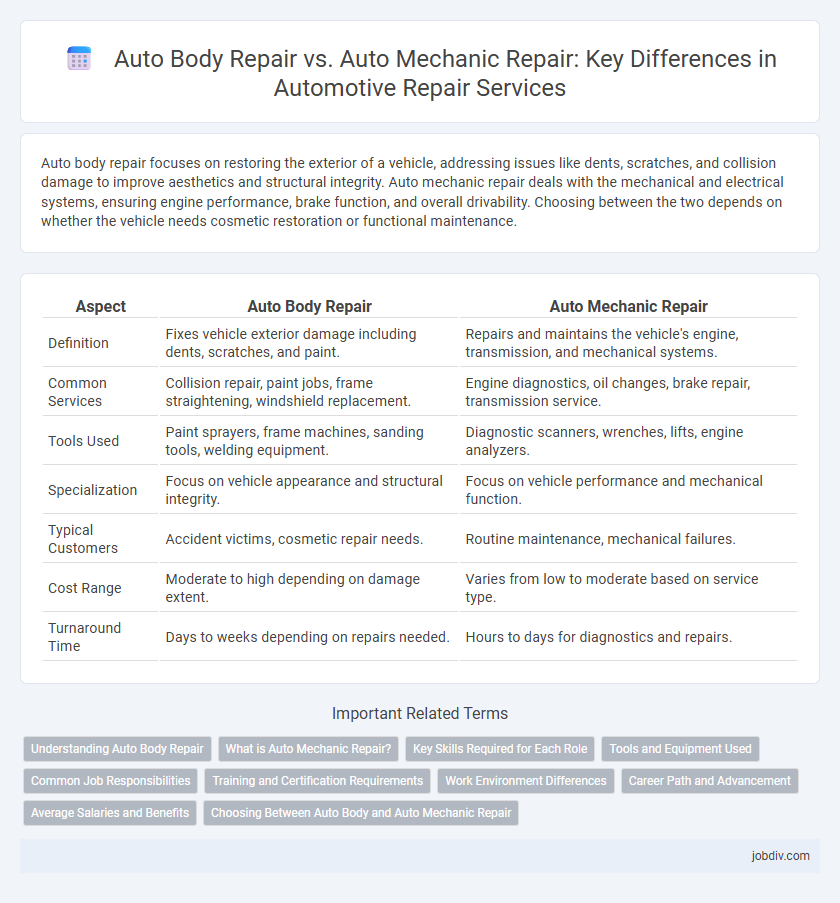Auto body repair focuses on restoring the exterior of a vehicle, addressing issues like dents, scratches, and collision damage to improve aesthetics and structural integrity. Auto mechanic repair deals with the mechanical and electrical systems, ensuring engine performance, brake function, and overall drivability. Choosing between the two depends on whether the vehicle needs cosmetic restoration or functional maintenance.
Table of Comparison
| Aspect | Auto Body Repair | Auto Mechanic Repair |
|---|---|---|
| Definition | Fixes vehicle exterior damage including dents, scratches, and paint. | Repairs and maintains the vehicle's engine, transmission, and mechanical systems. |
| Common Services | Collision repair, paint jobs, frame straightening, windshield replacement. | Engine diagnostics, oil changes, brake repair, transmission service. |
| Tools Used | Paint sprayers, frame machines, sanding tools, welding equipment. | Diagnostic scanners, wrenches, lifts, engine analyzers. |
| Specialization | Focus on vehicle appearance and structural integrity. | Focus on vehicle performance and mechanical function. |
| Typical Customers | Accident victims, cosmetic repair needs. | Routine maintenance, mechanical failures. |
| Cost Range | Moderate to high depending on damage extent. | Varies from low to moderate based on service type. |
| Turnaround Time | Days to weeks depending on repairs needed. | Hours to days for diagnostics and repairs. |
Understanding Auto Body Repair
Auto body repair focuses on restoring a vehicle's exterior, addressing damage such as dents, scratches, and frame issues caused by collisions or wear. This type of repair involves specialized techniques like paint matching, panel replacement, and structural alignment to ensure the vehicle looks as good as new. Understanding auto body repair helps differentiate it from auto mechanic repair, which primarily targets the vehicle's mechanical systems and engine performance.
What is Auto Mechanic Repair?
Auto mechanic repair focuses on the maintenance and fixing of a vehicle's engine, transmission, brakes, and other mechanical systems that ensure proper functionality and performance. This type of repair involves diagnosing issues like faulty spark plugs, worn-out belts, or engine malfunctions using specialized diagnostic tools. Skilled mechanics perform tasks such as oil changes, brake repairs, and engine tune-ups to keep vehicles running safely and efficiently.
Key Skills Required for Each Role
Auto body repair technicians specialize in restoring vehicle exteriors, requiring skills in metalworking, painting, and frame alignment to fix dents, scratches, and collision damage. Auto mechanics focus on diagnosing and repairing mechanical and electrical systems, needing expertise in engine repair, brake systems, and computerized diagnostics. Both roles demand precision and problem-solving abilities but differ in their technical focus on either cosmetic restoration or mechanical functionality.
Tools and Equipment Used
Auto body repair primarily utilizes tools such as paint sprayers, frame straighteners, welders, and dent pullers to restore a vehicle's exterior structure and finish. In contrast, auto mechanic repair relies heavily on diagnostic scanners, engine analyzers, socket sets, and specialized lifts to address mechanical and electrical system issues. Both sectors depend on advanced technology, but the equipment differs significantly based on whether the focus is bodywork or mechanical functionality.
Common Job Responsibilities
Auto body repair specialists focus on restoring vehicle exteriors by fixing dents, scratches, and frame damage, often working with paintless dent removal and panel replacement. Auto mechanic technicians handle engine diagnostics, brake repairs, transmission services, and other mechanical system maintenance to ensure optimal vehicle performance. Both roles require strong problem-solving skills but differ significantly in their core expertise and tools used.
Training and Certification Requirements
Auto body repair technicians typically require specialized training in collision repair and refinishing, often completed through vocational schools or community colleges, with certifications like I-CAR or ASE Collision Repair enhancing credibility. Auto mechanic repair technicians focus on engine, transmission, and mechanical systems, obtaining ASE certification for various specialties including engine performance and brakes. Both roles demand continuous education to stay updated with evolving automotive technologies and industry standards.
Work Environment Differences
Auto body repair primarily occurs in collision repair shops where technicians specialize in restoring vehicle exteriors, including dent removal, painting, and frame alignment, often working in dusty, paint-fume environments. Auto mechanic repair takes place in garages or service centers focused on engine diagnostics, brake systems, and transmission repairs, involving more mechanical tools and diagnostic equipment in a more enclosed, quieter setting. Both work environments require safety measures but differ significantly in noise levels, chemical exposure, and workspace layout.
Career Path and Advancement
Auto body repair specialists focus on restoring vehicle exteriors, including dent removal, painting, and frame straightening, often advancing to master technician or shop management roles. Auto mechanics diagnose and fix engine, transmission, and electrical issues, with career progression leading to specialized certifications, service management, or dealership positions. Both careers require ongoing training and certifications from institutions like ASE, but mechanics typically have broader opportunities due to the complexity of vehicle systems.
Average Salaries and Benefits
Auto body repair technicians typically earn an average salary of $42,000 to $54,000 annually, often receiving benefits such as health insurance and retirement plans, while auto mechanics earn slightly higher, ranging from $45,000 to $58,000 per year with similar benefits packages. Both professions may offer overtime pay and opportunities for bonuses, but auto mechanics sometimes have access to specialized training programs and certifications that can increase earning potential. Geographic location and experience level significantly impact salaries and benefits for both auto body repair and auto mechanic roles.
Choosing Between Auto Body and Auto Mechanic Repair
Choosing between auto body repair and auto mechanic repair depends on the damage type; auto body repair specializes in fixing exterior issues such as dents, scratches, and frame damage, while auto mechanic repair targets mechanical problems involving the engine, transmission, and brakes. Understanding the difference ensures efficient vehicle restoration by directing repairs to the appropriate specialist. Prioritizing the repair type based on symptoms and damage assessment optimizes both cost and repair time.
Auto Body Repair vs Auto Mechanic Repair Infographic

 jobdiv.com
jobdiv.com